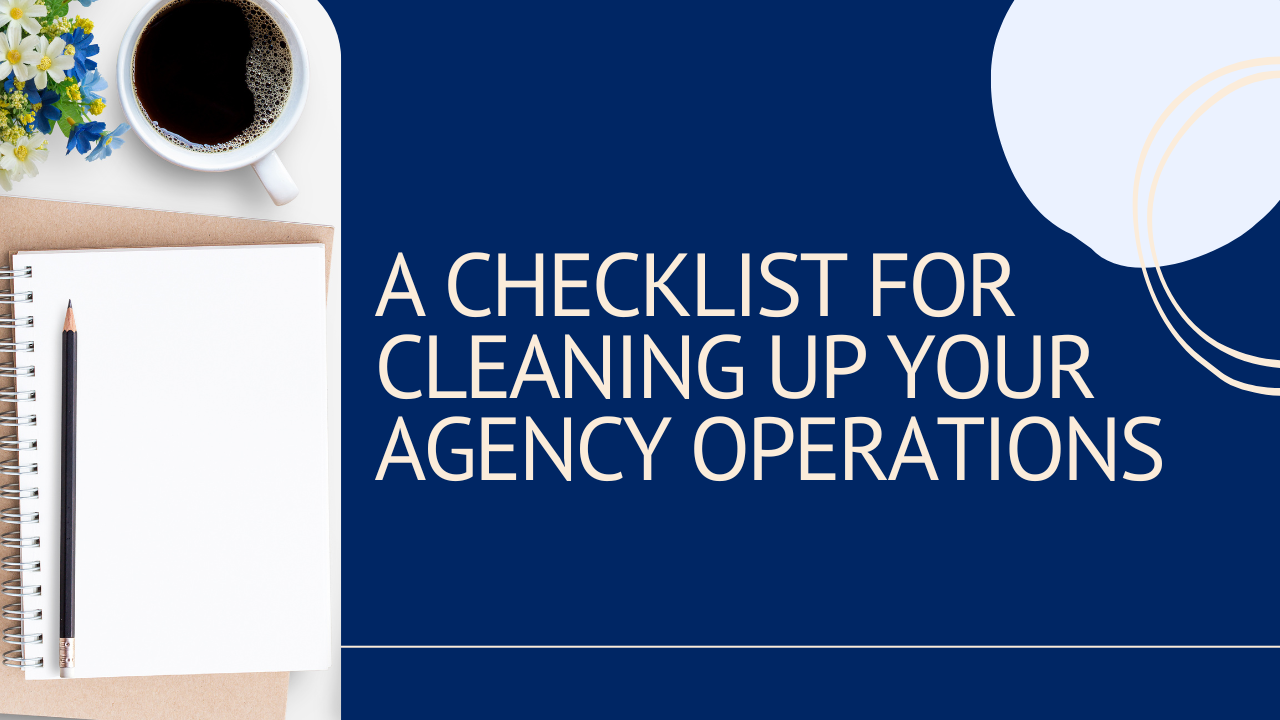A Checklist for Cleaning Up Your Agency Operations
Mar 20, 2023
Processes and operations are often put on the back burner until companies reach a breaking point. As a result, agency leaders often come to us on the verge of losing their sanity. The best way to prevent this is to check in on the core functions of the business throughout the year. We’re breaking down everything that agency leaders need to know about cleaning up internal operations.
For every agency we work with, we use a proprietary framework that includes the four key pillars necessary for a stable foundation of operations inside any agency:
1) Client Management
2) Financial Management
3) Team Management
4) Work Management
Our framework empowers agencies to laser focus on what will offer the most significant impact on their business. Thinking about operations in these four pillars allows agency leaders to feel confident in taking control and provides guidance to uncover which pieces need refinement now and which areas can wait. Start with one pillar and work your way through the list.

Work Management
This pillar focuses on how an agency manages its workload and encompasses everything from onboarding to reporting and work delivery for clients. Here are a few essential items to consider when cleaning up work management:
- What is the state of the agency’s project management tool? Is it serving its purpose? Most agency teams use tools to track client work, but not all tools are effective. Look at the information the tool provides and how your agency uses that data to streamline processes and keep client accounts on track.
- How is the company’s tech stack serving the agency overall? Technology can be an incredible tool for streamlining operations if used effectively. We break down the most common types of tools agencies use and how they can effectively use them here.
- Does the agency have a standard documented process for each core service? Reinventing the wheel each time a new client walks through the door is guaranteed to waste valuable time and, consequently, budget. Most agencies focus on a core group of services. Clearly defining processes for each will save time and mistakes in the long run.
Financial Management
We often see agency teams focus on client work as the only priority, with profit margins and budgets considered an afterthought. However, when agencies prioritize financial management as part of their standard operations, true financial health and stability are achieved. When auditing financials, agencies should ask:
- Is the agency over-servicing clients? First, check the scope of all existing client projects. If a team is working outside the scope of work and budget, look for opportunities to reset client expectations—further, host team retrospectives to update client scopes for new projects moving forward.
- What budget management systems does the agency have in place, and are they effective? An agency's most valuable asset is time. If the team isn’t tracking time or it isn’t monitoring or managing it until the end of each month, it’s challenging to ensure projects are not dipping into the red.
- What is the agency’s profit margin on each client? What is the net profit margin? Agencies can make adjustments when they clearly understand their current financial status.
Client Management
Client management is a top factor in an agency's overall health and success. Auditing client management processes can include honing in on:
- How is reporting being executed for clients? An effective process should include cadence, metrics, and communicating the agency’s overall value to the client. The goal of reporting should always be to convey the agency’s value and how results are helping the client achieve their goals and objectives. Additionally, effective reporting ensures agencies have a milestone in place to review their strategies and pivot if necessary.
- Are client meetings serving a purpose? We all know the saying, “this meeting could have been an email.” It’s essential to structure meetings to allow the agency to provide updates on work, communicate value, ask for assets needed, and offer time for the client to share questions and concerns. If client meetings feel chaotic and purposeless, update processes and agenda templates to address this.
- Is there an approach and process in place for client retention? For stability, agencies should focus on client retention first and acquisition second. We often find that agencies have great strategies for acquiring new clients but not always keeping existing ones. Consider opportunities to show clients additional value, offer additional support, and nurture a long-term relationship.
Team Management
An agency’s team is its greatest asset. It’s more crucial than ever that agency leaders focus on managing their teams effectively to retain top talent. The below questions are a great place to start:
- What is the agency’s approach to professional development? Is leadership aware of what areas each team is interested in when it comes to professional development?
- Does the agency have an organizational chart, and if so, does it need to be revised? A clear understanding of everyone's role ensures leaders can delegate properly and the team can seamlessly deliver client work.
- Does everyone on the team have clear KPIs? This is important to measure success and allow the team to feel empowered to grow in their roles and earn new opportunities within the organization. Growth opportunities and clear feedback are also considerable factors in increasing employee retention.
- Does everyone on the team have defined roles & responsibilities? Employees need to understand their roles to succeed and drive results and feel like they are contributing to company and client successes.
Overhauling agency operations can feel like an overwhelming task, but when broken down into the four pillars outlined within our framework, leaders can make a significant impact on their operations and bottom line where it matters most.
If you’d like to learn more from the Advocation team on best practices for PR & marketing agency teams, follow us on social media–Instagram, LinkedIn, and YouTube.


